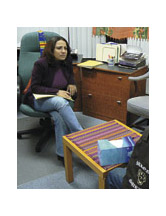In 2006, a woman named “K.S.” had to leave the African country of Chad after a government-connected bodyguard wanted to marry her.
K.S., who did not want her full name used and is in her mid-20’s, now lives in Jersey City. She explained last week how the dispute in Chad led to tragedy.
“One man [a bodyguard] wanted to be my husband, and my dad said, ‘I can’t give my daughter to you because she has someone else,’ ” K.S. said. “And then he came back one day and said, ‘I am not here to ask you; I’m here to take the girl. I don’t even have to ask you. I can just take her like that and no one can stop me. The only reason I ask you is because I show you a little respect.”
K.S. ran away from her home – a landlocked African nation of 10 million people – when the official came looking for her.
Later, her mother gave her bad news.
“She told me that they killed my uncle and they took my father, and my family is not anymore,” K.S. said.
She spoke for another minute before she started crying and stopped talking.
K.S. traveled alone to the U.S., then Canada, and then back to the U.S., as a refugee seeking asylum, or the protection of the government due to fears of persecution.
In April of 2008, K.S. came to Jersey City. She remains in her new residence, hoping she can stay here. But she is still getting used to her new home.
Helping immigrants
K.S. told her story recently in the office of the International Institute of New Jersey, located at the 1 Journal Square Plaza building in Jersey City.
Since 1918, this organization has helped immigrants and refugees adjust to American society through a number of programs, ranging from helping them learn English to finding a job.
K.S. is also one of 129 clients of the Institute’s Survivors of Torture Program.
Finding safe haven
Formed in the 1990s, the Survivors of Torture Program offers both mental health counseling and case management services for survivors of torture. Torture can include emotional abuse or having a family member killed.
The program has pro bono attorneys who can represent clients and help them file their asylum applications.
The program also provides referrals for housing, social services, medical consultations, food, and clothing.
Some of the countries represented along with Chad are Cameroon, Cote D’ Ivoire (sometimes known as the Ivory Coast), and Russia.
What these nations have in common is that there has been either political strife or economic hardship that has forced their populace to leave for other more stable locales.
Chad has been plagued by internal warfare and dictatorial leadership since it gained independence from France in 1960. The Office of the United Nations High Commissioner for Refugees estimates that 52,000 people have fled from Chad as of 2004.
What torture means
Rupa Khetarpal, who heads the Survivors of Torture Program, said the program helps clients like K.S. because of the common circumstances they face when coming to a new country such as the U.S.
“They faced themselves some kind of physical or psychological torture, or seen a loved one tortured or killed,” Khetarpal said, “and when they come here, they are alone, and it’s the first time they are away from their families and there is no support system.”
Khetarpal also noted that adding to their frustrating situation is the process of being approved for asylum, or getting “asylee” status. The United States sets a “refugee ceiling” every year for the amount of people allowed to come into the country. In 2008, the ceiling was set at 80,000.
The U.S. has three criteria to determine valid applications for asylum: those with serious security concerns, those coming from countries designated by the U.S. government as being of special concern, and those who are reuniting with a family member also in the U.S. seeking refugee status.
People receiving asylee status can apply for benefits such an unrestricted Social Security card, cash and medical assistance, employment assistance, and a Refugee Travel Document.
For more information on the International Institute of New Jersey and its programs, visit www.iinj.org.
Ricardo Kaulessar can be reached at rkaulessar@hudsonreporter.com.
